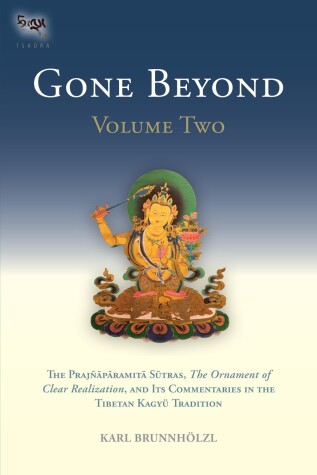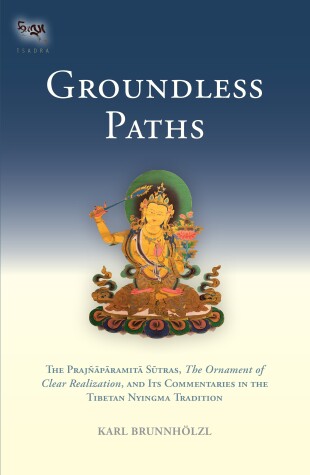The Prajnaparamita Sutras
2 primary works
Book 2
The Abhisamayalamkara summarizes all the topics in the vast body of the Prajnaparamita Sutras. Resembling a zip-file, it comes to life only through its Indian and Tibetan commentaries. Together, these texts not only discuss the "hidden meaning" of the Prajnaparamita Sutras—the paths and bhumis of sravakas, pratyekabuddhas, and bodhisattvas—but also serve as contemplative manuals for the explicit topic of these sutras—emptiness—and how it is to be understood on the progressive levels of realization of bodhisattvas. Thus these texts describe what happens in the mind of a bodhisattva who meditates on emptiness, making it a living experience from the beginner's stage up through buddhahood.
Gone Beyond contains the first in-depth study of the Abhisamayalamkara (the text studied most extensively in higher Tibetan Buddhist education) and its commentaries in the Kagyu School. This study (in two volumes) includes translations of Maitreya's famous text and its commentary by the Fifth Shamarpa Goncho Yenla (the first translation ever of a complete commentary on the Abhisamayalamkara into English), which are supplemented by extensive excerpts from the commentaries by the Third, Seventh, and Eighth Karmapas and others. Thus it closes a long-standing gap in the modern scholarship on the Prajnaparamita Sutras and the literature on paths and bhumis in mahayana Buddhism.
The first volume presents an English translation of the first three chapters of the Abhisamayalamkara and its commentary by the Fifth Shamarpa. The second volume presents an English translation of the final five chapters and its commentary by the Fifth Shamarpa.
Gone Beyond contains the first in-depth study of the Abhisamayalamkara (the text studied most extensively in higher Tibetan Buddhist education) and its commentaries in the Kagyu School. This study (in two volumes) includes translations of Maitreya's famous text and its commentary by the Fifth Shamarpa Goncho Yenla (the first translation ever of a complete commentary on the Abhisamayalamkara into English), which are supplemented by extensive excerpts from the commentaries by the Third, Seventh, and Eighth Karmapas and others. Thus it closes a long-standing gap in the modern scholarship on the Prajnaparamita Sutras and the literature on paths and bhumis in mahayana Buddhism.
The first volume presents an English translation of the first three chapters of the Abhisamayalamkara and its commentary by the Fifth Shamarpa. The second volume presents an English translation of the final five chapters and its commentary by the Fifth Shamarpa.
Book 3
The Abhisamayalamkara summarizes all the topics in the vast body of the prajñaparamita sutras. Resembling a zip-file, it comes to life only through its Indian and Tibetan commentaries. Together, these texts not only discuss the "hidden meaning" of the prajñaparamita sutras—the paths and bhumis of sravakas, pratyekabuddhas, and bodhisattvas—but also serve as contemplative manuals for the explicit topic of these sutras—emptiness—and how it is to be understood on the progressive levels of realization of bodhisattvas. Thus these texts describe what happens in the mind of a bodhisattva who meditates on emptiness, making it a living experience from the beginner's stage up through buddhahood.
Groundless Paths contains the first in-depth study of the Abhisamayalamkara (the text studied most extensively in higher Tibetan Buddhist education) and its commentaries from the perspective of the Nyingma School of Tibetan Buddhism. This study consists mainly of translations of Maitreya's famous text and two commentaries on it by Patrul Rinpoche. These are supplemented by three short texts on the paths and bhumis by the same author, as well as extensive excerpts from commentaries by six other Nyingma masters, including Mipham Rinpoche. Thus this book helps close a long-standing gap in the modern scholarship on the prajñaparamita sutras and the literature on paths and bhumis in mahayana Buddhism.
Arya Maitreya's Ornament of Clear Realization, with its Indian and Tibetan commentaries, presents the complex dynamics of the path to liberation as a succession of realizations of the empty nature of all phenomena. This presentation is a powerful antidote to whatever two-dimensional views we might hold about spiritual experience and the journey to enlightenment.
Groundless Paths contains the first in-depth study of the Abhisamayalamkara (the text studied most extensively in higher Tibetan Buddhist education) and its commentaries from the perspective of the Nyingma School of Tibetan Buddhism. This study consists mainly of translations of Maitreya's famous text and two commentaries on it by Patrul Rinpoche. These are supplemented by three short texts on the paths and bhumis by the same author, as well as extensive excerpts from commentaries by six other Nyingma masters, including Mipham Rinpoche. Thus this book helps close a long-standing gap in the modern scholarship on the prajñaparamita sutras and the literature on paths and bhumis in mahayana Buddhism.
Arya Maitreya's Ornament of Clear Realization, with its Indian and Tibetan commentaries, presents the complex dynamics of the path to liberation as a succession of realizations of the empty nature of all phenomena. This presentation is a powerful antidote to whatever two-dimensional views we might hold about spiritual experience and the journey to enlightenment.

